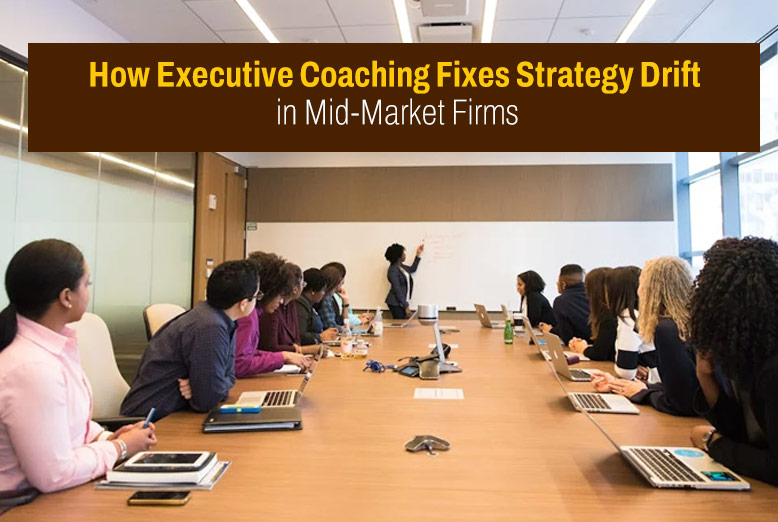Strategy drift sneaks in quietly. Markets shift, teams get busy, and last year’s plan keeps running on autopilot. Mid-market firms feel it most because resources are tight and a change hits fast. Executive coaching closes that gap. It builds clarity, habits, and alignment around what actually moves the numbers. Read on to learn how executive coaching fixes strategy drift in mid-market farms.
1. Diagnose reality with clean data
Drift begins when business leaders fly by gut feel instead of facts. A coach installs simple dashboards that track demand, unit economics, conversion, and cycle time by segment. This allows you to see what is working, what is stalling, and where cash burns. Weekly reviews replace anecdotes, and monthly deep dives convert insights into resource moves.
Additionally, you track leading indicators alongside revenue so you can spot trouble early and adjust. Over time, the cadence becomes culture, and decisions speed up because everyone shares the same view of reality. When done properly, coaching can deliver an ROI between five and 20 times the investment. This return comes from improved decision-making, greater confidence, and stronger team alignment, which convert into faster cycles and better customer outcomes.
2. Turn strategy into weekly operating rhythms
Coaching helps you convert the annual plan into simple weekly routines. You set one to three outcomes, one constraint to remove, and one experiment to run. You can track it on a one-page scorecard, and give every blocker an owner and a date. This helps to shorten meetings because next actions are clear and handoffs are tight.
Add a short Friday check to grade progress, not activity. You should also capture wins, misses, and what changes on Monday. Review the leading indicators beside revenue to catch drift early. Momentum builds when strategy shows up in schedules, checklists, and follow-ups.
3. Strengthen accountability across layers
Drift hides in the spaces between teams. A coach works with leaders to define who owns what, the service levels, and the definition of done across sales, product, finance, and operations. Expectations move from vague to visible.
Coaching also reveals gaps early. Talent issues surface before they stall projects, so that you can upskill or hire. Teams adopt simple service agreements and a basic RACI for big initiatives. Additionally, people know what good looks like, when to escalate, and how to hand off work cleanly. Results improve because accountability is built into daily routines.
4. Build a change engine that survives turnover
Strategy resets fail when they depend on one personality. Coaching installs playbooks, templates, and training that persist as leaders rotate. You onboard new managers to the same scorecards, cadences, and decision rules.
In addition, knowledge stops leaking. You can capture decisions in short memos, record quick walkthrough videos, and store them in one hub. Run monthly retros that celebrate wins and refine plays. The company compounds learning, even in choppy markets.
Endnote
Strategy drift is not a character flaw. It is a systems issue that coaching can fix with clarity, cadence, and accountability. Start with a three-month sprint focused on data truth, value thesis, and operating rhythms. Make sure to set baselines before you begin, then measure weekly.
Within a quarter, you should see fewer priorities, tighter execution, and better unit economics. Keep what works, and repeat the cycle as markets change. Pick a coach with operating depth in your industry and a bias for practical tools.







